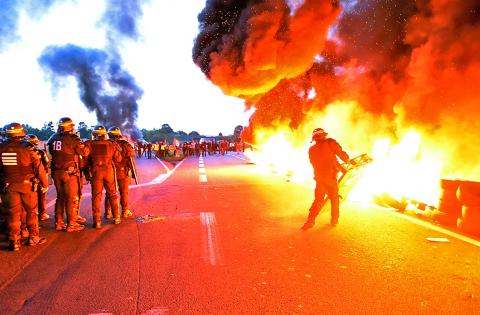French police yesterday fired water cannons to disperse scores of protesters blocking a northeastern oil depot, as pumps ran dry and unions stepped up strikes in a bitter battle over labor reforms.
With one-fifth of gasoline stations in France running low, police moved in to break a blockade at the depot of Douchy-les-Mines near the Belgian border that had been in place since Thursday last week.
“They cleared out all our barricades. The depot was unblocked without confrontation,” said Willy Dans, a spokesman for the local branch of the SUD union. “The police moved in quickly. They used water cannons. We got the feeling they were tense.”

Photo: AFP
Watched by about 80 striking workers, firefighters extinguished burning tires that were blocking roads and sending thick plumes of smoke billowing into the air.
Most gasoline stations in the area were empty, forcing motorists to hop over the border to Belgium to fill up, a photographer on the ground reported.
The blockades are part of a wave of social unrest that has seen thousands take to the streets in often violent protests against labor reforms proposed by French President Francois Hollande’s deeply unpopular socialist government.
“We have to fight” against the reforms, Dans said, adding he felt the movement had popular support.
On Tuesday, top union leader Philippe Martinez vowed to continue the strikes until the labor legislation is withdrawn.
At least six out of the eight refineries in France have either stopped operating or have reduced output due to strikes and blockades, and transport is further hampered by a rolling strike on the trains, causing chaos for commuters.
The social unrest has raised concerns for the smooth running of the month-long Euro 2016 soccer championships, due to start on June 10.
“It’s beginning to get to a critical point,” said Pascal Barre, who runs a logistics firm in Poincy, east of Paris. “We filled up at the end of last week and at the beginning of this week, but our drivers need to fill up again and it’s not possible.”
“If we can’t deliver to shops and supermarkets, it’s going to put France on its knees,” he said.
However, the government has started using its strategic oil reserves to counter the union blockades of its refineries, the Union Francaise des Industries Petrolieres (UFIP) said.
“Yes, a small quantity of the stock has been drawn. It was authorised by the government, only the government can authorize it,” UFIP spokeswoman Catherine Enck said.
UFIP president Francis Duseux told RMC radio that the industry had been using the strategic reserves for two days.
“Every day we use the equivalent of about one day of consumption. At worst, if the situation remains very tense, we can do this for three months,” he said.
In related news, workers at the hardline CGT union on Tuesday voted for a 24-hour strike at the Nogent-sur-Seine nuclear plant starting last night.
Workers at other nuclear plants were due to meet yesterday to decide on possible further strikes, he said.
Additional reporting by Reuters

VAGUE: The criteria of the amnesty remain unclear, but it would cover political violence from 1999 to today, and those convicted of murder or drug trafficking would not qualify Venezuelan Acting President Delcy Rodriguez on Friday announced an amnesty bill that could lead to the release of hundreds of prisoners, including opposition leaders, journalists and human rights activists detained for political reasons. The measure had long been sought by the US-backed opposition. It is the latest concession Rodriguez has made since taking the reins of the country on Jan. 3 after the brazen seizure of then-Venezuelan president Nicolas Maduro. Rodriguez told a gathering of justices, magistrates, ministers, military brass and other government leaders that the ruling party-controlled Venezuelan National Assembly would take up the bill with urgency. Rodriguez also announced the shutdown

Chinese President Xi Jinping’s (習近平) purge of his most senior general is driven by his effort to both secure “total control” of his military and root out corruption, US Ambassador to China David Perdue said told Bloomberg Television yesterday. The probe into Zhang Youxia (張又俠), Xi’s second-in-command, announced over the weekend, is a “major development,” Perdue said, citing the family connections the vice chair of China’s apex military commission has with Xi. Chinese authorities said Zhang was being investigated for suspected serious discipline and law violations, without disclosing further details. “I take him at his word that there’s a corruption effort under

China executed 11 people linked to Myanmar criminal gangs, including “key members” of telecom scam operations, state media reported yesterday, as Beijing toughens its response to the sprawling, transnational industry. Fraud compounds where scammers lure Internet users into fake romantic relationships and cryptocurrency investments have flourished across Southeast Asia, including in Myanmar. Initially largely targeting Chinese speakers, the criminal groups behind the compounds have expanded operations into multiple languages to steal from victims around the world. Those conducting the scams are sometimes willing con artists, and other times trafficked foreign nationals forced to work. In the past few years, Beijing has stepped up cooperation

Exiled Tibetans began a unique global election yesterday for a government representing a homeland many have never seen, as part of a democratic exercise voters say carries great weight. From red-robed Buddhist monks in the snowy Himalayas, to political exiles in megacities across South Asia, to refugees in Australia, Europe and North America, voting takes place in 27 countries — but not China. “Elections ... show that the struggle for Tibet’s freedom and independence continues from generation to generation,” said candidate Gyaltsen Chokye, 33, who is based in the Indian hill-town of Dharamsala, headquarters of the government-in-exile, the Central Tibetan Administration (CTA). It